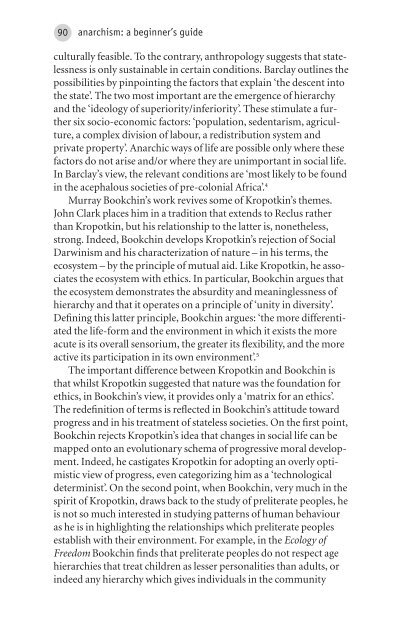o_195qg5dto17o4rbc85q1ge61i84a.pdf
You also want an ePaper? Increase the reach of your titles
YUMPU automatically turns print PDFs into web optimized ePapers that Google loves.
90<br />
anarchism: a beginner’s guide<br />
culturally feasible. To the contrary, anthropology suggests that statelessness<br />
is only sustainable in certain conditions. Barclay outlines the<br />
possibilities by pinpointing the factors that explain ‘the descent into<br />
the state’. The two most important are the emergence of hierarchy<br />
and the ‘ideology of superiority/inferiority’. These stimulate a further<br />
six socio-economic factors: ‘population, sedentarism, agriculture,<br />
a complex division of labour, a redistribution system and<br />
private property’. Anarchic ways of life are possible only where these<br />
factors do not arise and/or where they are unimportant in social life.<br />
In Barclay’s view, the relevant conditions are ‘most likely to be found<br />
in the acephalous societies of pre-colonial Africa’. 4<br />
Murray Bookchin’s work revives some of Kropotkin’s themes.<br />
John Clark places him in a tradition that extends to Reclus rather<br />
than Kropotkin, but his relationship to the latter is, nonetheless,<br />
strong. Indeed, Bookchin develops Kropotkin’s rejection of Social<br />
Darwinism and his characterization of nature – in his terms, the<br />
ecosystem – by the principle of mutual aid. Like Kropotkin, he associates<br />
the ecosystem with ethics. In particular, Bookchin argues that<br />
the ecosystem demonstrates the absurdity and meaninglessness of<br />
hierarchy and that it operates on a principle of ‘unity in diversity’.<br />
Defining this latter principle, Bookchin argues: ‘the more differentiated<br />
the life-form and the environment in which it exists the more<br />
acute is its overall sensorium, the greater its flexibility, and the more<br />
active its participation in its own environment’. 5<br />
The important difference between Kropotkin and Bookchin is<br />
that whilst Kropotkin suggested that nature was the foundation for<br />
ethics, in Bookchin’s view, it provides only a ‘matrix for an ethics’.<br />
The redefinition of terms is reflected in Bookchin’s attitude toward<br />
progress and in his treatment of stateless societies. On the first point,<br />
Bookchin rejects Kropotkin’s idea that changes in social life can be<br />
mapped onto an evolutionary schema of progressive moral development.<br />
Indeed, he castigates Kropotkin for adopting an overly optimistic<br />
view of progress, even categorizing him as a ‘technological<br />
determinist’. On the second point, when Bookchin, very much in the<br />
spirit of Kropotkin, draws back to the study of preliterate peoples, he<br />
is not so much interested in studying patterns of human behaviour<br />
as he is in highlighting the relationships which preliterate peoples<br />
establish with their environment. For example, in the Ecology of<br />
Freedom Bookchin finds that preliterate peoples do not respect age<br />
hierarchies that treat children as lesser personalities than adults, or<br />
indeed any hierarchy which gives individuals in the community




